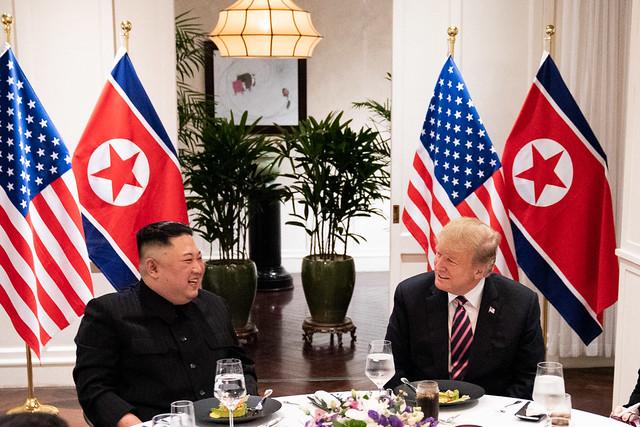
In an article about the meeting between US President Donald Trump and North Korean leader Kim Jong-un in Hanoi in February, I shared the sentiment that Trump needed to allow his administration to prepare more carefully for any future negotiations with North Korea. More specifically, I suggested that he invite China and Russia to associate themselves openly with the negotiations, at least to the extent of developing a joint stance with the US on security assurances for the DPRK. I said that:
Pyongyang needs to hear a new, and unanimous, narrative to the effect that the security of the DPRK is robust rather than fragile; that these three countries are determined, collectively, to protect this state of affairs; and that, in these circumstances, they expect the DPRK to denuclearise expeditiously and focus its full energies on economic development.
A few weeks later, on 28 April, Trump’s national security adviser, John Bolton, told Fox News in Washington that Kim clearly favoured the bilateral format followed in Singapore and Hanoi and that this also remained Trump’s preference. Bolton added that Trump was mindful of the failure of the six-party talks that took place between 2003 and 2007 and implied that the president’s advisors were not disposed to recommend broadening participation in any future negotiations.
I would not suggest for a moment that these statements are directly connected. Many commentators believe it’s time to expand participation in these negotiations. It remains very likely, however, that something will be needed to change the trajectory of these negotiations. One can urge the two principals to trust one another but—despite protestations of a genuine personal warmth between the leaders—both sides feel they have done that before, and have the scar tissue to show for it. What’s needed is something that will change the dynamics of any future engagement without requiring either leader to overtly step away from the core tenets of the position they have set out.
That ‘something’ should both offer positive reinforcement of the benefits that would flow from a genuine resolution of this old problem and block off or deter the use of the bolt holes that have been exploited in the past to stall or derail negotiations. On more than one occasion, North Korea has walked away from negotiations, or threatened to do so, contending that Pyongyang was being given no choice other than to continue to rely exclusively on its massive conventional forces and whatever weapons of mass destruction it was able to assemble.
A common or coordinated set of security assurances from the US, China and Russia could be worth looking at in this context, though it wouldn’t be a straightforward exercise. To highlight the most obvious difficulty, the US will not—and should not—qualify its commitment to the security of South Korea. The US offered and spelled out the security assurances it was prepared to give in the context of the broad bargain that took shape during the six-party talks. Those ideas would obviously be part of the exercise being proposed here.
The notion of trilateral security assurances ticks some important boxes. It would give Kim substantially more room for manoeuvre domestically. Even if one is of the view that the DPRK’s extreme paranoia about the threat from the US was overwhelmingly a device to legitimise exceedingly repressive domestic arrangements, this has now been sustained for so long that no one in North Korea has the courage or imagination to think otherwise. And, apart from the Kim regime, an important part of the entrenched difficulties on the Korean peninsula has been that it is seen as unfinished business between the major powers. In 1949 and 1950, Russia and China endorsed and discreetly aided North Korea’s use of force to bring the South into the socialist camp. That effort was inconclusive but subsequent efforts to put Korean affairs on a more normal and stable footing have been contaminated by lingering instincts to ensure that the geostrategic balance sheet finishes up tilted in a manner favourable to one or other of the major players. This complicating influence is, if anything, exacerbated if Russia and China are allowed to try and advance their interests from the relative obscurity of the fringes of the US–DPRK process.
And the simple fact that there is an opportunity for the US, China and Russia to reconcile their competing strategic interests and find sufficient common purpose in attempting to resolve the North Korean issue is not something to be scoffed at in today’s international political climate.